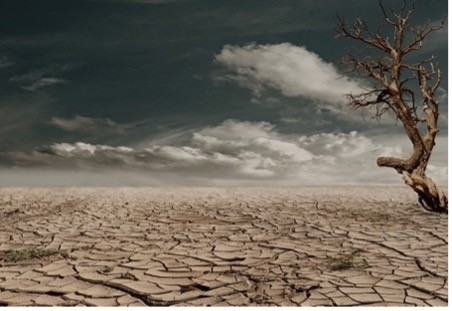1 Kings 17: Drought and resurrection
“…there will be neither dew nor rain in the next few years except at my word.” 1 Kings 17:1
“The Lord heard Elijah’s cry, and the boy’s life returned to him, and he lived.” 1 Kings 17:22
How much do we understand drought and famine? It’s difficult to imagine in northern Europe at the moment, when rain seems to fall every day. But while it’s not long ago that we had empty reservoirs and hosepipe bans, for us, real drought is very rare. Many countries in the world face erratic rainfall all the time; sometimes drought, and the people suffer in what follows, harvest failure, disease and dehydration, famine.
That is physical drought. What about the drought of the soul and the spirit? Maybe in the West, with busy lives, lack of close community, with the constant pull of material things and technology, most of us understand this better. A sense of dryness, of shrivelling up, of lack of fruitfulness, of frenetic tension instead of calm. Guilt, anger, loneliness, no relief. The opposite of green pastures and still waters.
The bible talks about a famine of the word of God (eg Amos 8:11), when people are not interested in the Creator and his communication to us. They replace him with other gods and ideologies. But because the one true God is real and has created us to be satisfied in him, when we reject that relationship and turn away, it brings his judgement.

1 Kings 17 tells us about a situation of physical and spiritual drought.
1. The cause: Sin - the apostasy of God’s people
The end of the previous chapter shows Ahab following a repeated pattern of Israel’s rulers replacing the worship of Yahweh with gross public idolatry. As a result he “aroused the anger of the Lord” (1 Kings 16:33).
2. The result: Judgement in the form of drought.
Through the prophet Elijah, God says no rain will fall until further notice. This raises serious questions for our modern sensibilities. Isn’t he a God of love? Doesn’t this judgement mean that innocent people are punished for the sins of the rulers? From this story and the bible as a whole we can see that God is in control of the universe; he has perfect standards and cannot allow evil to continue unchecked. God’s judgement is finally in the future, but is enacted in different ways in the present. Jesus taught that we can’t always link suffering to judgement for specific sins (eg Luke 13:1-5; John 9:1-3). God’s judgement is always deserved, because he is perfectly just.
3. God’s initiative to save his people: Mercy
God’s judgement is always tempered by mercy which is not deserved, So, in the midst of severe crisis of drought affecting a whole region at the time of Elijah and Ahab, God does not withdraw. He speaks his word through his prophet; he enables people to survive. Elijah is fed miraculously, while others must have found daily bread and water in different ways.
4. God’s Grace: salvation extended to the people of his enemies
In time the stream in the place where Elijah is hiding dries up. God tells him to go to Zarephath, where he is again kept alive miraculously. This is significant because Zarephath is in a foreign country. It is the country that the evil queen Jezebel comes from, near Sidon in northern Lebanon. So the mercy of God is extending beyond the people of God, to the gentiles, even to the origin of violent pagan religion. God has chosen Israel as his special people, bearers of his message, but his intention is to reach the whole world with his love.
In Elijah’s encounter with the poor widow of Zarephath, we see three amazing things:
- The old woman agreed to share her last bit of food. A destitute widow, in a pagan land, is an agent of God’s mercy to a servant of God. In the midst of suffering, there are always many testimonies of acts of kindness and daily provision.
- God made the food last, enough for each day. Like manna. God provides for his people with daily bread, forgiveness, strengthening of spirit.
- The sick boy is raised from death.


5. God’s Transformation
Christians are called to pray for good weather and for our daily bread; we must be compassionate towards those in need. But Jesus taught us that spiritually, we need more than physical food. We need a transformation of the human condition, where sin leads to judgement and death.
When the boy dies, the devastated mother knows that her kindness to the man of God has not protected her from this disaster. Elijah’s response is not resignation, stoicism, spiritualisation. He doesn’t say “oh well, people die, but you can have hope in heaven”. He passionately cares about the widow’s suffering and God’s glory. He is involved emotionally and physically. He cries to the Lord, takes the boy’s dead body and embraces it. And the boy is restored to life. This is a similar miracle to Lazarus with Jesus. God wants to show he can do more than keep alive and postpone death – he can bring back from the dead. He wants us to have more than survival – he wants us to experience transformation, from death to life!
God’s intervention starts with something private, in a poor widow’s home. But his intention is to go public with a demonstration of his power against the pagan prophets. It starts with the raising of a dead boy. It continues to heavy rain after three years of drought, bringing life back to a dead land, and the spiritual renewal of his people.

For us, the resurrection of Christ, infinitely mightier than what Elijah witnessed with the boy in Zarephath, is not just a single, historical fact, which confirms our theological belief that Jesus is the Son of God. It is a demonstration of a principle by which God operates in and through his people in a sinful world under judgement. Christian ministry in the West can feel like being in a time of drought, where the rulers of the nations, the people around us and even some church leaders don’t want to hear the word of God. The resurrection of Jesus shows that God knows we need daily sustenance, food and the word of God, and the hope of heaven, but he wants us to trust him for a turnaround in our circumstances. The risen Christ begins with quiet gospel transformation of the lives of individuals and families, and then goes on to change nations!